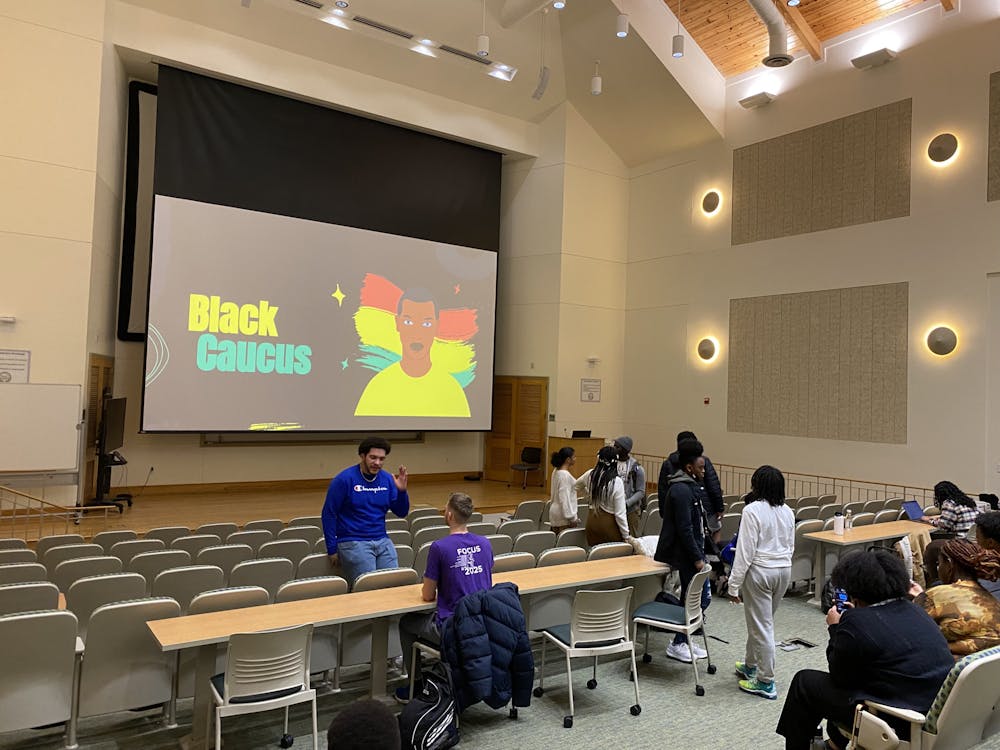Duke Black Student Alliance hosted a Black Caucus at White Lecture Hall Wednesday night, where students shared campus grievances and discussed potential solutions. BSA Advocacy and Black Caucus co-chairs Avery Smedley and Sarah Hasan, both sophomores, and the Advocacy and Black Caucus committee organized the event.
According to Smedley, Black Caucus is a space where Black students can talk about their experiences at Duke, what they want to change, and how both they and Duke can improve the Black student experience.
Students held discussions on four topics: class unity, after-college preparation, Black Duke and Duke at large, and Duke administration.
Hasan said these topics were selected because they were some of the main themes discussed at the organization’s first event of the semester, “One Foot in the Door, One Foot Out.”
Class unity
Senior and moderator Allyson Ashekun described her class as being “on track to be tight-knit” during her first semester before the pandemic. While the pandemic affected their closeness, Ashekun felt her class was getting back to where they had started.
According to notes taken by moderators at the event and provided to The Chronicle, juniors also felt affected by the pandemic and felt it made them have a “lack of cohesion.”
Sophomore students felt in their class that event attendees were almost exclusively Black women, according to the notes. First-years were described as very active and as having “the best class union.”
Junior Elyana Riddick, co-chair of outreach and service, said it’s important for the Black presence to be visible in order to improve class unity.
“There’s not a lot of reminders on campus that there’s Black people,” Riddick said. “If we want to make this campus feel like home, we have to make it a reminder of home.”
Students attending the caucus suggested Black homecoming faculty, more programming targeted to sophomores and juniors, and legacy nights where upperclassmen could offer advice to underclassmen as potential solutions.
Black Duke and Duke at large
Students encouraged BSA to be more inclusive to all identities, according to moderator notes, and suggested more collaborations with organizations like Duke Africa, Duke Students of the Caribbean and Duke Ethiopian/Eritrean Student Transnational Association.
When Ashekun, one of the moderators, asked what Black Duke and Duke in general could do to be more inclusive to Black LGBTQ+ students, junior Jada Purkett responded that “BSA specifically needs to do a better job at reaching out and making those safe spaces.”
“If we really want to make a space for Black queer students, we have to be intentional in doing that … There are a lot of Black students at Duke who are LGBTQ who are lost when it comes to events or friends or finding community,” Purkett said.
According to moderator notes, students further brought up the possibility of chartering a Black LGBTQ+ group on campus.
“Black queer people on campus deserve a space for themselves on campus,” the notes read.
Black athletes at the caucus further expressed that they at times felt unwelcomed by other Black students and described the presence of a misconception that Black athletes are less smart, according to the notes.
Football player R.J. Oben, a senior, said he was told by some Black students that he wasn’t allowed at the Mary Lou Williams Center for Black Culture. He said this made him “not feel welcome, something that permeates throughout years.”
Students proposed having Black student sections at athletic events and attending athletic events in general as a way to address these feelings of unwelcomeness, according to the notes.
Oben suggested letting people know that BSA would like to see them come to events, stating it would improve relationships with Duke athletes.
“When you’re seeing your community come in and support you, I’m like ‘Okay, this person also wants me to go to the social or come to their event,’” Oben said.
After-college preparation
Sophomore Grace Williams, co-director of racial and multicultural diversity and outreach for Duke Student Government, said first generation low-income Black students’ “first and number one need” was financial support.
Students present at the caucus suggested having informational meetings about financial support and pushing Duke to have drop-in meetings with advisors or booklets for students, according to moderators’ notes.
Students further requested BSA to “sift through resources and aggregate them for students to easily find,” according to the notes.
Purkett also described the issue of seeking out an internship but feeling dismissed by faculty when needing information on whether it was paid or not.
In addition to discussing financial information needs, students discussed ways to have more Black alumni and faculty involved in the Black community.
One student, according to moderator notes, requested having Black homecoming activities, which would encourage more Black alumni to return to campus. Another student, according to the notes, shared that they had not had a Black professor for two years, which led to recommendations from others to involve Black faculty more.
Students further encouraged peer advising events to help with planning majors and long-term plans after college, according to notes. Legacy nights, where upperclassmen offer advice and tips to underclassmen, were also considered during the caucus.
Duke administration
Sophomore and moderator Destiny Benjamin described administration’s reasoning behind “so-called racially progressive initiatives” as "off" and brought up Duke's history of integration.
"In integration, their reasoning was [economic]. Funding would be pulled if they did not integrate. That was something the federal government made clear during that time," Benjamin said.
Benjamin further recalled that when emailing administration after an incident, she would only receive generalized information or be redirected to a new person.
“I didn’t ask for that … show me a show of humanity and care for your Black students,” Benjamin said.
Riddick further described interacting with faculty at Duke as “battling two fights” — being the only Black person in a class and the mental strain of constantly having to explain herself. She says she does not want her entire Duke experience to be educating and debating people.
“I deserve to be in this class and I deserve to take a space,” Riddick said.
After the caucus
Hasan says the caucus gave her enough information to do her job effectively next semester.
Smedley hopes to see Black student’s concerns be taken more seriously, especially after the Duke Alert from this September and the East Campus bridge vandalism in October 2021.
Hasan says while she hopes for allies on campus, students should make sure they are doing it “for the right reasons" and not to only care about Black issues when it is beneficial or on social media.
“There's not a lot of times where people pay attention to Black voices when it's not from a place of pain,” Hasan said. “So this space is really to uplift it … because blackness isn't just something that is happening. It's also everyday life and how we interact with Duke’s campus.”
Get The Chronicle straight to your inbox
Signup for our weekly newsletter. Cancel at any time.

Ayra Charania is a Trinity junior and a senior editor of The Chronicle's 118th volume.

